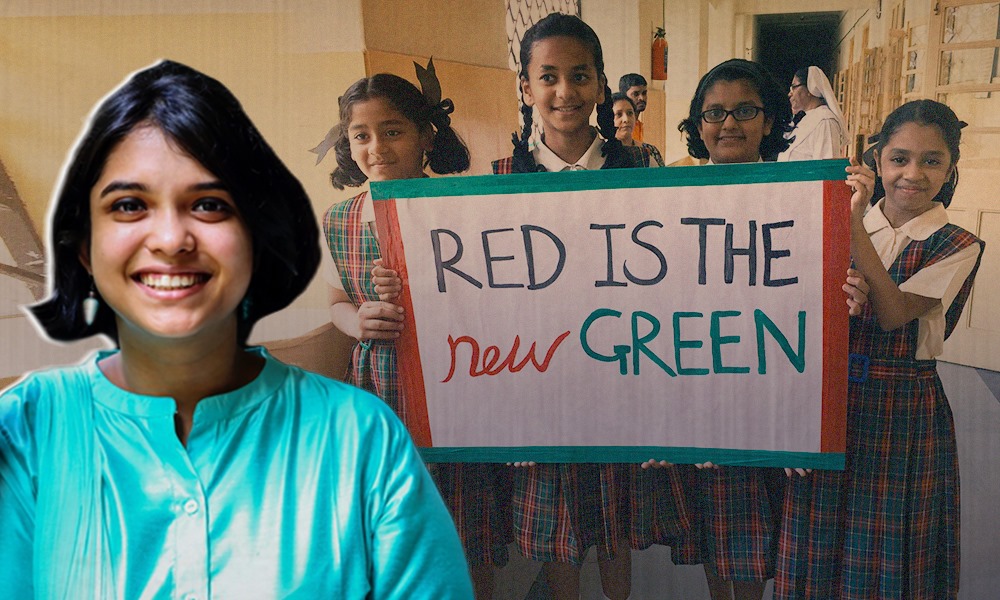
Mumbai Girl Reaches Out To 14,000 Women In Fight Against 'Sanitary Pad Crisis'
Maharashtra, 25 July 2020 11:03 AM GMT | Updated 26 July 2020 4:29 AM GMT
Creatives : Abhishek M |
" An engineer by profession, Abhishek is the creative producer of the team, graphic designing is his passion and travelling his get away. In more ways than one, he makes the content visually appealing."
During the COVID-19 lockdown, women and girls who live in low-income areas or were migrants, lost access to sanitary care, due to loss of income, unavailability of menstrual hygiene products and the stigma attached to menstruation.
Over the past three months, 26-year-old Deane De Menezes and her team in Mumbai, have been working hard to reach out to women living in low-income areas. De Menezes, who made it to the Forbes '30 under 30' Asia list in 2019, has distributed over 240,000 sanitary napkins across the city, reaching out to at least 14,000 young girls and women.
"During the COVID-19 lockdown, women and girls who live in low-income areas or were migrants, lost access to sanitary care, due to loss of income, unavailability of menstrual hygiene products and the stigma attached to menstruation," explains De Menezes, creator of the Red is the New Green (RING) initiative to reduce stigma around menstruation and provide sustainable options for menstrual hygiene and management.
"When I faced trouble in getting sanitary pads from a local chemist shop, I realized that if a privileged girl like me is facing difficulty in getting menstrual health products, the situation of underprivileged women would be worse."
According to the findings from a rapid online survey conducted by Menstrual Health Alliance of India (MHAI) with 67 organizations involved in relief work during COVID-19 across India, Africa and other nations, 62% of respondents said that in the communities they work with, access to menstrual products from regular consumer channels has become challenging during the pandemic, and 22% organizations reported that there was no access to menstrual products.
Since schools and colleges are closed due to the pandemic, girls can no longer access the free sanitary napkins that are provided to them under various government schemes and other initiatives.
To address these issues, Ms De Menezes has been working on the ground along with RING volunteers, NGO partners, UNICEF and officials of Brihanmumbai Municipal Corporation (BMC) to donate sanitary napkins and spread awareness around menstruation and COVID-19. RING also procures sanitary napkins from a self-help group (SHG), run by a government scheme called Asmita Yojana, where rural women earn a livelihood from making sanitary napkins.
"We used to get sanitary napkins in school but post the pandemic we are at home, and only male members of the family step out. I was hesitant to ask them to bring pads. Thanks to this distribution drive, I now have pads that are sufficient for at least three months," explains Kiran, a schoolgirl in Mumbai.
After reports surfaced that women were reverting to using unhygienic cloths during the lockdown, the volunteers at RING decided to educate girls and women about hygienically utilizing cloth pads, guiding them on steps to wash and dry the pads thoroughly to avoid infections.
"In the suburbs and containment zones, women don't have access to clean washrooms and running water. Hence, it becomes very difficult to properly wash a cloth. This can expose the women to infections," explains Ms De Menezes.
"We've got the support of local area coordinators who help us in identifying those who can't afford menstrual health products. RING has also partnered with UNICEF's Jeevan Rath programme to provide sanitary napkins at their mobile stations that are helping migrants."
Pragya, a mother of two, who lives in Mulund, a suburb in the north-east of Mumbai, has been a recipient of RING's awareness-raising work.
"During these testing times, a young girl thought about us. I didn't know that unhealthy practices can cause urogenital infections. It was only during one of the awareness sessions I got to know about the healthy practices and also received sanitary napkins. I passed this information to my daughter as well. Even if we have to use a cloth pad now, I will ensure that it is properly washed and dry at the time of use."
RING has also kicked off a campaign called #PassOnThePad to raise money to help more women in the city and is planning to host virtual workshops and arrange for therapists to carry out a session on why some women may be experiencing severe premenstrual syndrome (PMS) during the lockdown.
"Pass on the pad is a campaign to raise funds to provide menstrual hygiene products to everyone who menstruates and is struggling during the pandemic. We believe that having access to these products is every woman's fundamental right, whether there's a pandemic or not" explains Ms Aashna Shah, Creative Head at RING.
"These funds will be utilized to empower women and SHGs to produce sanitary pads. We are also reaching out to vendors to make these pads biodegradable. Hygiene is of utmost importance, but certain sections of society are in dire need of funds to meet their needs. Through this campaign, we hope to reach out to as many people in need as possible."
Acknowledging WSSCC's presence in India, Ms De Menezes, who was a part of 'Period Paath,' a campaign organized by Youth Ki Awaaz – a platform for Indian youth – in collaboration with WSSCC, shared "I've been a big admirer of initiatives launched by WSSCC in India, and I am happy that it is evolving into the Sanitation and Hygiene Fund because having a dedicated fund, which focuses on addressing Menstrual Health and Hygiene (MHH) gaps will help us ensure that menstruation becomes a non-issue."
Also Read: Opinion: Achieving Public Health Equity Start With Sanitation And Hygiene For All
 All section
All section















